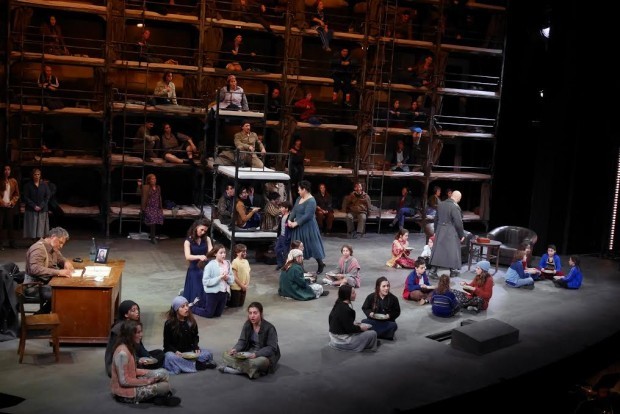 Spain Verdi, Otello: Liceu Orchestra and Chorus / Philippe Auguin (conductor), Gran Teatre del Liceu, Barcelona, 5 & 7.2.2016. (JMI)
Spain Verdi, Otello: Liceu Orchestra and Chorus / Philippe Auguin (conductor), Gran Teatre del Liceu, Barcelona, 5 & 7.2.2016. (JMI)

Verdi, Otello
Production: Berlin Deutsche Oper
Direction: Andreas Kriegenburg
Sets: Harald Thor
Costumes: Andrea Schraad
Lighting: Stefan Bolliger
Casts:
Otello: Carl Tanner/Marc Heller
Desdemona: Ermonela Jaho/Maria Katzarava
Iago: Marco Vratogna/Ivan Inverardi
Cassio: Alexey Dolgov
Emilia: Olesya Petrova
Ludovico: Roman Ialcic
Roderigo: Vincenç Esteve Madrid
Montano: Damian del Castillo
These performances of Verdi’s Otello seem to have been born “sotto maligna stella,” as the protagonist himself says in Act IV. Numerous cancellations and substitutions took place, which is always a problem but even more so in Otello, a work in which the withdrawal of the protagonist is a tragedy. To begin, there was the cancellation of Aleksandar Antonenko in the first cast, followed by Stuart Neill in the second. The Liceu solved the problem by casting José Cura and Carl Tanner as Otellos. The Argentine tenor couldn’t secure the entire run, so in the last performances Carl Tanner was lifted to the first cast, while Marc Heller was Otello in the second. Then Carmen Giannatasio cancelled as Desdemona, which brought Ermonela Jaho into the first cast while María Katzarava took her place in the second.
The production by Andreas Kriegenburg is basically monotonous and dull. The action is set in modern times in a refugee camp, and the stage features stacks of beds at the back. To this boring set a large bed is added at the end of Act I and in the last act. The stage direction is deficient, particularly in Act IV which seems almost better suited to an opera buffa. Something similar can be said about the scene of the Venetian ambassador’s arrival, which is poorly resolved.
The musical direction was entrusted to Philippe Auguin, whose reading was fine overall but more convincing and alive with the first cast. He was making his debut at the Liceu, and it has been a generally positive experience. Under his baton, the orchestra was good though not brilliant. As for the chorus, they are not now the excellent group of a few years ago and showed problems in the third act.
When one compares Carl Tanner’s performance with that of Marc Heller, he seems like a new Mario del Monaco. Of course, not really, but he is an Otello with a well-suited voice; the disadvantage is that he tends to hold back. But his voice is attractive and fairly homogeneous, and he was an acceptable interpreter: not a great Otello, but a serviceable one. However, Marc Heller’s Otello in the second cast was a disappointment.
Ermonela Jaho was a delicate Desdemona, offering beautiful piani in the last act. However, she was almost inaudible at times and showed a lack of power in the more dramatic moments of the third act. Maria Katzarava did well in the part and her voice was powerful enough, but she was almost unable to offer any piani in her big scene in Act IV.
The only survivor of the first cast was Italian baritone Marco Vratogna as Iago. He is a good interpreter with a strong voice, though he is not known for his elegant singing or the beauty of his timbre. Ivan Inverardi was a modest Iago of very little interest and had problems with voice projection.
Russian tenor Alexey Dolgov also failed to convince as Cassio. Is it necessary to go that far to find a Cassio? Roman Ialcic was too modest in the role of Ludovico. Vincenç Esteve Madrid did a good job with Roderigo, and Olesya Petrova was a sonorous Emilia.
José M. Irurzun
